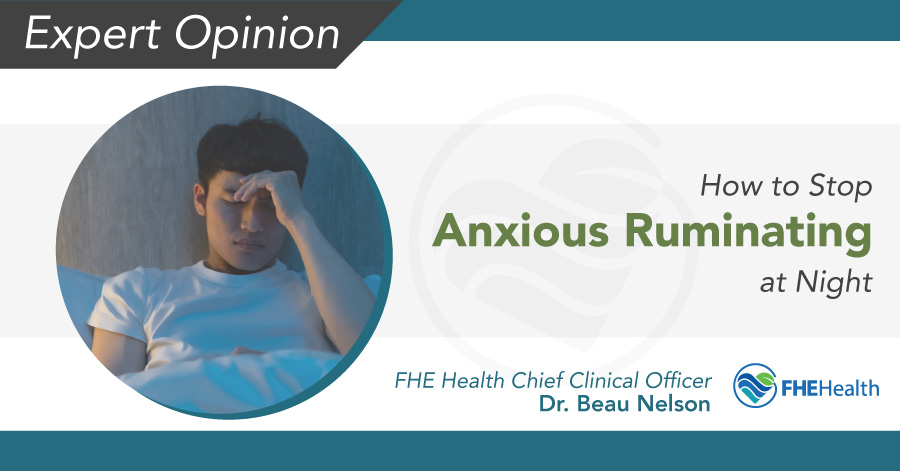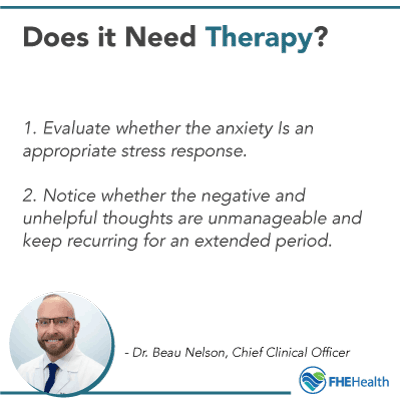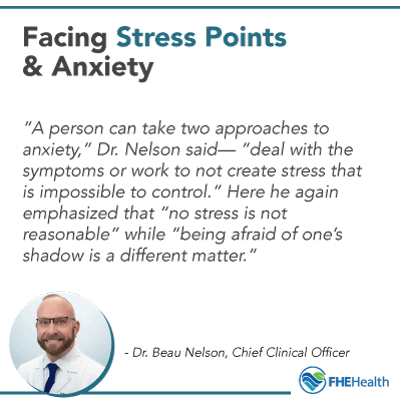
This article has been reviewed for accuracy by our peer review team which includes clinicians and medical professionals. Learn more about our peer review process.
As many as 30 percent of adults in this country suffer from insomnia, according to statistics from the Sleep Foundation. The disorder, which is characterized by persistent problems with falling asleep, staying asleep or getting good sleep, can be caused by various factors such as stress, worries, or mood.
Researchers have found that one factor in particular—anxious rumination—plays an important role in contributing to insomnia. Those racing thoughts at night are one of the most common yet intractable reasons for sleep problems. They are also the source of many a quest to get help.
FHE Health Chief Clinical Officer Dr. Beau A. Nelson, DBH, LCSW, is no stranger to the issue of nighttime ruminating and ways to address it. With a specialization in cognitive-behavioral therapy (CBT), Dr. Nelson has expertise at helping patients manage and find freedom from the thoughts, feelings, and behaviors that are adversely impacting their quality of life. In a recent interview, he shared some tips and insights for anyone who may be struggling with anxious rumination at bedtime.
Why Is My Anxiety Worse at Night? What Nighttime Anxiety Is
It’s a common question: Many people want to know why their anxiety seems to peak at bedtime or in the middle of the night. The answer to that question has everything to do with the nature of nighttime anxiety. Dr. Nelson described it this way:
Generally speaking, there is no “nighttime anxiety” unless someone is afraid of the dark or something else that occurs at night, either real or imagined. Most often, a person who has anxiety is busy and distracted most of the day and will only notice symptoms sporadically. However, when there are no distractions and they try to sleep, it can feel as if there is this symphony of thoughts and ideas going off and that these thoughts cannot be stopped.
These intrusive thoughts may or may not be negative, Dr. Nelson explained. They might be about deadlines, memories, and other random topics, for example—”although the more negative they are, the more disturbing they will generally be.”
Another cause of anxious rumination before bed can be “a difficulty in slowing down and getting into a restful state.” Abruptly switching speeds—and slowing down from 60 mph to 0 mph in a very short timeframe—can make it harder to get to sleep (“unless someone is just exhausted and passes out from tiredness”).
When ruminating occurs in the middle of the night, it often happens after a disturbance in sleep such as the “shock of a dream,” followed by the “fear that it is not possible to go back to sleep, that tomorrow is going to be ruined by not getting back to sleep, and similar obsessive or ruminating thoughts about one’s quality of sleep and the amount necessary to function acceptably.”
How to Know If Anxiety at Night Needs Therapy
 We asked Dr. Nelson how to tell the difference between anxious thoughts and feelings that may be a natural and passing reaction to stress versus a health issue that needs therapy. He offered the following suggestions…
We asked Dr. Nelson how to tell the difference between anxious thoughts and feelings that may be a natural and passing reaction to stress versus a health issue that needs therapy. He offered the following suggestions…
Evaluate whether the anxiety is an appropriate stress response. Stress is “normal” and can be “necessary to function as a human being.” In fact, stress not only is a part of how people are made”—it is a “natural and even effective emotion when rightly applied to a given situation.”
Even anxiety attacks, as a form of “hyperarousal” … “are part of the body’s natural ‘flight or fight’ response necessary for survival,” Dr. Nelson said. “It is beneficial to have a burst of adrenaline and blood sugar to jump out of the way of an oncoming car.” In contrast, this level of hyperarousal would not be beneficial when you’re “sitting on the couch to watch an episode of ‘I Love Lucy.’”
If high anxiety and rumination are happening frequently in the absence of an obvious stressor, that may be a sign that it is time to seek help.
Notice whether the negative and unhelpful thoughts are unmanageable and keep recurring for an extended period. “Unhelpful thoughts are those which have no solution” and that “you cannot do practically anything about … This cyclical thinking is ruminative and there is really no way off the hamster wheel. Rehearsing a negative event in the past will not change it, the more we remember it and we think negatively, it will grow to be more negative and disturbing over time.” Similarly, “‘fortune telling’ a negative event in the future is also fruitless, as very few people possess accurate psychic abilities, so the story just keeps going around and around.”
If these thoughts seem to “be beyond one’s control and continue for a period of time, or are distressing, a licensed mental health professional can help a person learn sleep hygiene skills, such as how to maximize good sleep,” Dr. Nelson said. He noted that cognitive behavioral therapy is also effective at treating anxiety.
How to Find Nighttime Anxiety Relief
 When asked if he could offer some advice for how to find nighttime anxiety relief, Dr. Nelson began by defining thoughts as “just strings of letters put together in our mind” which “of themselves have no power.” It is our negative belief and interpretation of the word as it applies to oneself that exerts power.
When asked if he could offer some advice for how to find nighttime anxiety relief, Dr. Nelson began by defining thoughts as “just strings of letters put together in our mind” which “of themselves have no power.” It is our negative belief and interpretation of the word as it applies to oneself that exerts power.
“A person can take two approaches to anxiety,” Dr. Nelson said— “deal with the symptoms or work to not create stress that is impossible to control,” recognizing that “no stress is not reasonable.”
He also recommended some practical steps for these approaches:
- “Exercise—(cardio is best)—to relieve stress chemicals and tension in the body.
- Eat right and give the body the nutrition it needs to function optimally.
- Avoid substances such as alcohol or drugs that create unwanted physical effects.
- Manage stress with yoga, mindfulness, spirituality, or talking with others.
- Challenge unhelpful thoughts and try and come up with a more rational way of thinking about a given situation, person, or event. For example, “Talk to yourself as you would to someone you loved and cared about who was thinking this way. How would you help them? Then follow your own advice.”
How to Stop Anxiety and Stop Being Paranoid at Night
Dr. Nelson also had some helpful tips for combatting anxious ruminating at bedtime and stopping anxiety in its tracks. He gave the following advice:
- “Start small. Have a journal by the bed, and before you go to bed write down whatever you would be thinking about and give yourself a conscious ‘pass’ until tomorrow to deal with it.
- Create a restful routine to wind down before bed, take a warm shower, and have a cool sleeping space. Turn off technology 45 minutes before bed. Do something relaxing, such as reading or listening to soft music.
- Practice deep breathing (also known as belly breathing or diaphragmatic breathing) to turn off the stress chemicals in your body.
- Practice an affirmation that allows you to feel at peace and let go of thoughts. Maybe read something spiritual, pray, or meditate on a beautiful picture in your mind. Sometimes listening to a podcast that is soothing can help to distract the mind from worrying thoughts. While this may not be a long-term fix, it can help to make the bedroom more of a relaxing space.”
Anxious ruminating at bedtime is a very common human experience. The good news is that by employing these strategies and others, you can learn how to tame and reduce the anxiety that may be keeping you from a good night’s sleep.






